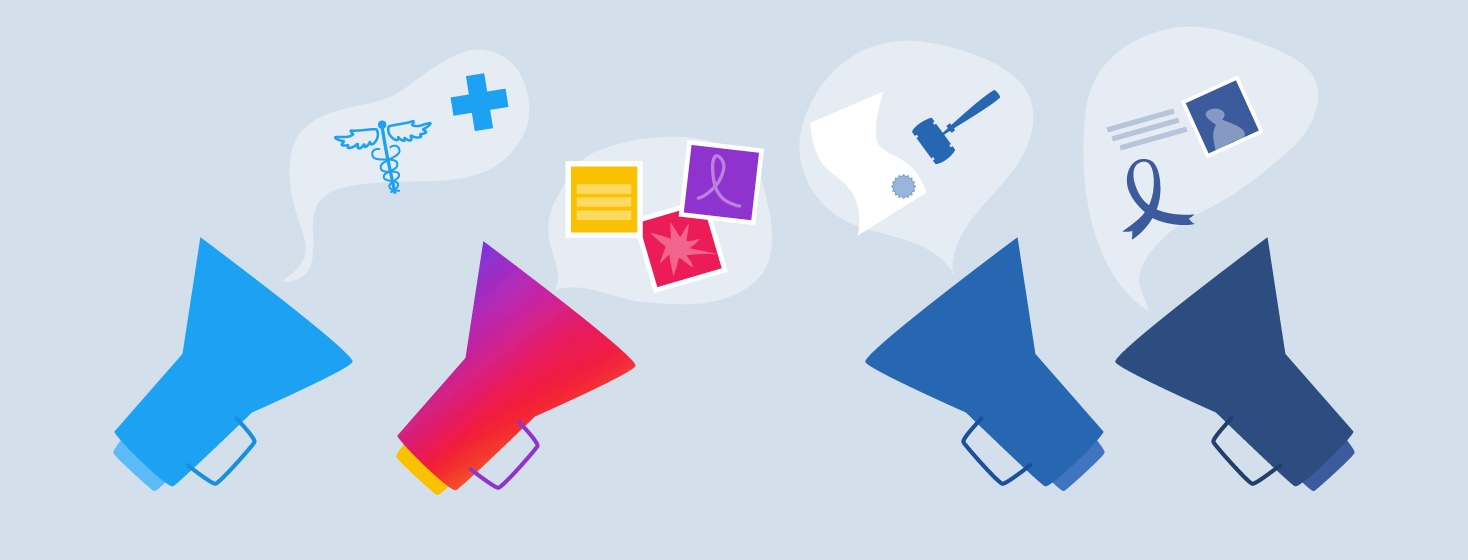Patients Can Raise Big Voice!
I have seen, from Facebook, several times that the lung cancer patients in the USA protested in front of the White House or the Stage legislation to raise their concerns, even dismay of governments about lung cancer. For a while, it puzzled me. I wonder if such a movement is useful? Will politicians hear the patients' concerns? What kind of negative impact will come about after protesting for cancer patients?
Fascinated by political advocacy
I couldn't understand the mindset to have political advocacy. From my background living in China before I settled down in Canada, I only experienced the Tian-An-Men Square Movement in 1989, which was started and carried out by millions of university students against the Chinese government's corruption. It ended up with the government sent the army, killed and arrested many students. Political advocacy or demonstration is unheard of in China.
However, in the USA and Canada, it seems routine. I'm fascinated to see the peaceful yet effective political advocacy or demonstration.
Learning to become a political advocate
In Canada, because we don't have pharma companies that can produce the COVID-19 vaccine, the Canadian Government imports the vaccine from Europe and India. To have more people vaccinated for one dose, the NACI (National Advisory Committee on Immunization, Canada) decided to have only one dose of vaccine for everybody. The 2nd dose will be postponed for four months as the first shot. Britain and several European countries did the same thing. The evidence is that through the real-world data, the efficiency is 85% of Pfizer vaccine when two doses vaccine are four months apart.
Here is the caveat. Cancer patients are much less protected against COVID-19 than other people after one dose of the Pfizer vaccine. Research has documented in the clinical trial that three weeks after one dose of the Pfizer vaccine, the antibody responses are only 39% of patients with solid tumors compared to 97% of people with no cancer.1 However, following a second dose three weeks after the first one, there was a sharp rise in their antibody response against the coronavirus to 95% as compared to 100% Pfizer vaccine.
Finding my advocacy "why"
The NACI leaves the problems to the provincial government to decide with immunocompromised patients, like cancer patients. However, the Manitoba Government still didn't consider the fact and decided that cancer patients have to wait four months to have the 2nd dose vaccine.
It's a perfect chance for me to do political advocacy to the provincial government this time, although my mind flashed back, concerned about the negative effect on me.
Step 1. Preparation
I first planed it out in detail and did more research on the matter. The scientific paper I referred to published by a British journal is the primary evidence.1 At the same time, I also gathered several other reports.
Step 2. TV news interview
I arranged for a local TV interview about the urgency to have a second dose of vaccine for cancer patients. Working with media was very exciting, although I couldn't help control the butterflies in front of the camera. I wrote to the reporter at a local TV station, who often reports the Manitoba news, a letter detailing the problems. When the reporter got back to me at 2:00 PM, she wants to interview at 3:00 PM; I have to submit the 2 or 3 pictures by 4:00 PM. Then CTV News broadcasted it at 6:00 PM. Everything is so fast. I'm impressed that the reporter knows how to take the portion of my talk out, and with her words, she told the story short but concisely. In the end, I was pretty pleased with my interview and the efficiency of the media.
Step 3. Meeting with politicians and fellow advocates
The third part is to have a meeting with politicians. I sent a series of letters to the Health Minister, Government Opposition Party, and the local elected officials at my constituent, all at the provincial government level. The Opposition Party returned my email in about one hour promised the assistant to speak to me. One hour later, the executive assistant contacts me, and we talk about the details. On the second day, he proposed a meeting with the Opposition Party leader and the Health Critic.
Meanwhile, I prepared a detailed document and invited two more lung cancer patients, one throat cancer patient, and a representative with Lung Cancer Canada. On the meeting day, we met with the Opposition Party leader and Health Critic. I played a significant role in presenting the reasons to vaccinate the 2nd dose COVID-19 vaccine for cancer patients according to manufactures' recommendations.
Building a support network
I didn't do everything alone. I got the support of Lung Cancer Canada when meeting with the politicians. They guided me through each step and helped tremendously in getting this important message out to the public.
One week later, the Manitoba Government changed the policy to allow cancer patients and organ transplants to be the first to get the 2nd dose vaccine following the manufacturers' schedule.
We can use our voices to make a difference
This was the first time I played a leading role, or any role, in political advocacy in my adult life. I found that political advocacy is extremely effective to raise patient concerns. From my experience, politicians CAN hear the patient voice.
I noticed that it's crucial to have somebody involved who is experienced. I'm fortunate to have Lung Cancer Canada to guide me to meet politicians. I also found that it's important to have cancer friends with me so that I wouldn't be alone. This time, there were only four cancer patients with me to talk to the politician, but it's essential to have many cancer patients behind. That way, we can raise a big voice.

Join the conversation